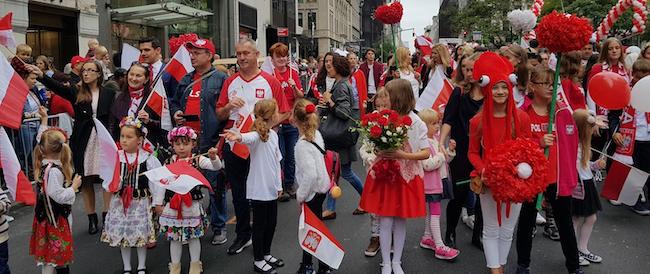May 2nd – Day of Polonia – Polish Diaspora Abroad
A holiday of all Polish emigrants celebrated on May 2nd since 2002.

Established by the Sejm of the Republic of Poland – lower house of parliament, on the initiative of the Senate of the Republic of Poland – higher house of parliament – in recognition of the centuries-old achievements and contribution of Poles abroad to Poland’s regaining independence, loyalty and commitment to Polishness and helping the country in the most difficult moments.
In a narrower sense, the Polonia – Polish diaspora is a term for people who feel Polish origin and have ties with Polishness but were born outside Poland. These people maintain ties with the national tradition and culture in the second or later generations and identify themselves with Polish matters at a different level. This term applies, for example, to Polish communities in the USA, Canada, France, Brazil, which are dominated by people whose ancestors left Poland decades ago.
Polonia – The Polish diaspora should be distinguished from the Polish national minority. Only Polish emigrants and their descendants are considered to be Polonia. This term does not include people and their descendants living in territories that in the past belonged to the Polish state but have found themselves outside Poland as a result of the change of borders. The argument in favor of this position is the statement that these people never left Poland, but for reasons beyond their control, they found themselves outside the Polish state, and the fact that they themselves consider themselves Poles and not Polish diaspora.
After the border changes in 1945, there are 3 clusters (one of them has recently disappeared) of Polish natives outside Poland. These areas include:
– Zaolzie (Silesia, which was mostly lost in the Middle Ages, Poland recovered it in 1945, mainly Zaolzie with the population belonging to the Silesian subgroup of the Polish nation remained outside of Poland, while Polish immigrants from Galicia, mainly in Ostrava, were almost completely assimilated by the Czechs, Zaolzie autochthons formed a developed Polish cultural background, including Polish education, organizations and the media.
– Spisz (lost in 1769 – at the end of the 19th century, the Polish population was almost completely assimilated there by the Slovaks).
– Eastern Borderlands – “Kresy Wschodnie” (lost in 1772–1795 as a result of partitions, partially recovered in 1918–1921 and lost again in 1939–1945 to the USSR.
The number of Polonia and Poles abroad is assessed differently. This is due to the use of various criteria, such as being born in Poland, multi-ethnic origin, knowledge of the Polish language or declared awareness of origin. In some countries censuses are carried out, in others only general estimates are made, which also reduces the comparability of data. It is estimated that 18-20 million Poles and people of Polish origin live outside Poland. One third of this group are Poles born in Poland, the rest are people of Polish origin with varying degrees of ties with Polishness. Polonia – the Polish diaspora and Poles abroad are in the sixth place in the world in terms of the number of people in their native country.
In Canada, the Polish community has a population of approximately 1 million and in the United States, approximately 10 million.


